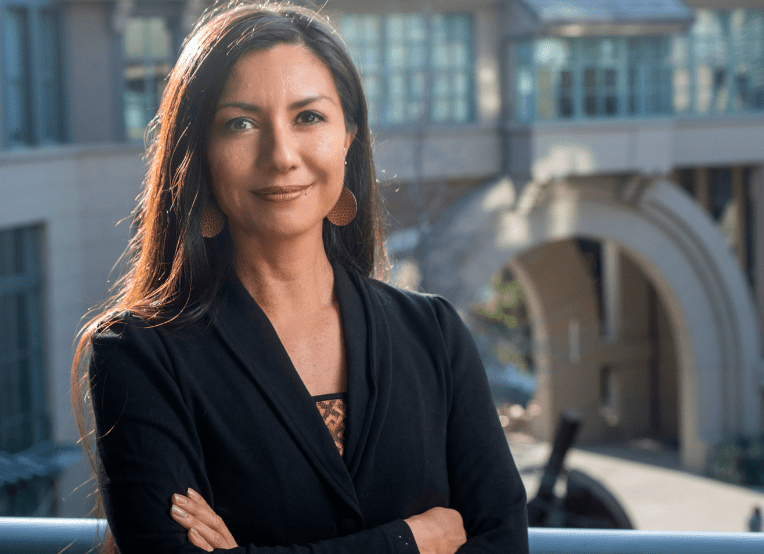
When Élida Bautista arrived at Berkeley Haas as director of diversity, equity, and inclusion in 2018, she found a community “ready to do the work and not just pay lip service” to diversity.
Since then, she’s worked alongside that community, building the school’s first five-year DEI strategic plan and creating a culture shift toward one of greater belonging—or, as she puts it, “a place where people can see themselves.” This week, Bautista—who came to Haas after spending 15 years developing programs focused on social justice, diversity, and inclusion for UCSF’s Department of Psychiatry—became the first woman and Chicana/Latina to be named chief DEI officer at Haas.
We spoke to her about her most pressing priorities, how the pandemic impacted her work, and the diversity-related initiatives she plans to work toward over the next five years.
What are you most proud of accomplishing during your interim DEI chief role at Haas in the past year?
One of the accomplishments I am most proud of is getting input from the community to implement our DEI strategic plan. Last year, the Diversity, Equity, and Inclusion (DEI) team started off with listening sessions across Haas.
We wanted to learn what teams were accomplishing, how they were integrating DEI in their work and to give people a space to feel heard. Those listening tours helped us refine and implement a Haas-wide DEI strategic plan and positioned us as thought partners in helping teams carry out their own DEI initiatives.
As we launched, it was important to be transparent with our community. We publicly shared the plan on our website, and shared regular updates about progress on our deliverables on our website, something that had not happened before. That was meaningful to our community because it allows everyone to get involved and to see our progress as well as any delays.
Beyond the DEI plan, what broad initiatives are you working on that dive deeper into DEI?
We are looking to continue creating a DEI culture shift at Haas. But we’re not just thinking about diversity as scholarships and increasing admissions and representation. That’s an important part of it, but we must simultaneously build a place where people can see themselves. We’re thinking about how we get more diverse folks in the door, but also about their experiences once they’re here in the classroom or the workplace.
We must…build a place where people can see themselves.
We are creating a sense of belonging through a variety of offerings, including co-curricular educational and professional development activities, as well as community social events.
We also need to invest in pathways toward making our faculty more diverse. One way we’re doing this is by creating a postdoctoral fellowship through a gift from Allan Holt, MBA 76. Postdocs offer the opportunity to bring scholars into the faculty pipeline who might not otherwise pursue a faculty career at a university where there is a very high level of research activity. We also set aside part of the funds to integrate DEI into the curriculum.
What are your most pressing goals in the new role?
As a chief diversity officer who sits on the management team, my pressing goals are focused on partnering with our associate deans of academic affairs to increase diversity in faculty hiring, support retention and promotion efforts for our underrepresented faculty, and support DEI curricular offerings. At a strategic level, my goal is to support our dean and our senior managers in effectively addressing diversity, equity, inclusion and belonging-related challenges, and collectively continuing to make progress on our strategic plan. Additionally, I will be involved in providing feedback to the chairs of the search committees about the diversity of our faculty candidates. Over time, our postdoctoral fellowship will be an additional source for increasing the diversity of the faculty pool.
How has COVID impacted your job during the pandemic?
COVID magnified a lot of existing disparities and social injustices—everything from who had to keep going to work in-person to who had access to health insurance to treat COVID if they got sick. We also saw a rise in visibility of violence targeting some communities. This increased the sense of vulnerability that needed to be integrated into our team’s offerings and approach.
Initially during the pandemic, a lot of our work was about holding space for community members to reflect, as well as offering managers tips to understand how to support staff who might be having a different experience during this time. We asked: How do we extend empathy at a time when everybody is feeling overwhelmed and stretched?
How does it feel to be back on campus?
Now that we’re back on campus, there’s a renewed sense of connection that we all need. Being back allows people to engage in a more authentic way with each other, which makes my work a little bit easier when we’re talking about learning across differences. Being online made these connections more challenging. For example, if everyone is off camera and one person is talking and nobody’s clapping or smiling or affirming, it’s unclear if your message has resonated with anyone.
What would be a major achievement for Haas in the next five years in DEI?
I think we’re well on our way, but a major achievement would be to make Haas the leader among business schools in reputation regarding diversity, equity, inclusion, and belonging, based on our robust offerings, the skills our students gain while at Haas, and the type of leaders we produce.
Another major achievement would be to make meaningful gains in the representation of women among our students across degree programs and among our faculty, including more women of color, LGBTQIA+ women, women veterans, and women with disabilities.
Also, as UC Berkeley continues to advance toward becoming a federally designated Hispanic Serving Institution (HSI) by 2027, a major achievement would be to align Haas with the recommendations of the HSI task force and position ourselves to serve the needs of Latinx/Chicanx and underrepresented communities on campus.